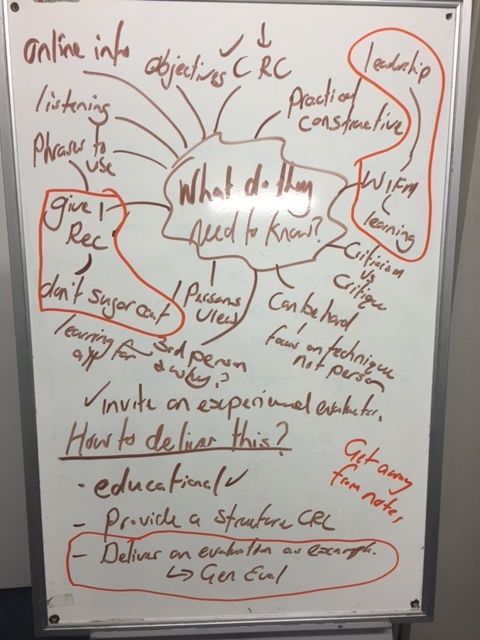At our last meeting he facilitated a group discussion on evaluations.
The purpose was to establish a set of "must-have" elements that when combined would form a good evaluation.
The reason behind the mini-workshop was to provide people who were inexperienced at receiving and giving evaluations a solid foundation to work with. The core question to be answered was; "What do they need to know?" The goal was to generate a list of take-away points which could then be used as an ongoing reference.
The result was a fascinating, dynamic, and engrossing look at exactly what was important in the art of evaluation worthy of sharing.
 |
| The evaluation brainstorm |
Why evaluate?
Evaluation provides feedback allowing a speaker to hear how his/her delivery was experienced. Without it we work on supposition and assumption. A Toastmaster's evaluation shifts assessment from an internal subjective response to an external, structured and hopefully, reasonably objective one.
A good evaluation reinforces and extends what we are already doing, or learning to do, well and recommends aspects that could benefit from fine tuning. It is a powerful tool - a vital part of learning to be a better speaker.
What should be in an evaluation?
It should focus on the content of the speech; its structure, delivery and suitability for the audience. It should NOT be a retelling of the speech itself.
It also should be in the 3rd person rather than directly referencing the speaker. This removes the "personal" from the evaluation and additionally opens it to include the whole audience. It gives us all an opportunity to learn.
An evaluation is always of the speech, and never the person.
An acknowledgement that these are the evaluator's opinions. They are not facts. Statements need to be owned. Eg. "I think..." "I feel..."
How should an evaluation be structured?
An easy and good way is to follow the objectives outlined in the manual for the speech delivered. Has the speech met them? Where? How?
The Commend, Recommend, Commend model is proven as efficient and effective. It provides a palatable platform to give (and receive) recommendations without speaker on the receiving end feeling overwhelmed by how much they have to learn. We feel so much better about ourselves if our strengths are acknowledged, as well as our challenges.
Recommendations should be specific, doable and come with examples that the speaker can use as a starting point to improve. Example: I think xxx would benefit from doing diction exercises. They would help speech clarity. There's a series of tongue twisters here that will provide hours of fun.
Even if the speaker is accomplished the evaluation should include something they can tweak to enhance their presentation - however small it may be. And as noted on the whiteboard "don't sugar coat".
Commendations also need to be anchored in specific detail. Comments like "That was marvelous" may be flattering but they're meaningless unless they're attached to an example. Eg. I particularly liked your use of a rhetorical question as an opening. It hooked the audience in -sat them up and made them listen.
How do people learn to evaluate well?
- Observe and learn from more experienced speakers. Having excellence modeled is very effective.
- Conduct an educational and invite experts to share their wisdom.
- Provide feedback to the evaluators through the General Evaluator role on what was good and what needed fine tuning.
Where do people find more information on giving evaluations?
Toastmaster's International has articles on them and Googling the phrase 'Toastmasters evaluations' will pull up a wealth of responses. I particularly like this one from Andrew Dlugan: The Art of Delivering Evaluations which has ongoing links into more useful material.
What are the benefits of giving evaluations?
We are learning important and valuable leadership skills - the ability to express an opinion and back it, while supporting a person (the speaker) respectfully.
In summary
The session was a valuable reminder about one of the core attributes of the Toastmasters' programme - a part that makes it very special. In learning to evaluate well, we also learn to take criticism well, to respond usefully to challenges and to genuinely encourage others to extend themselves.
Thanks Gary!



No comments:
Post a Comment